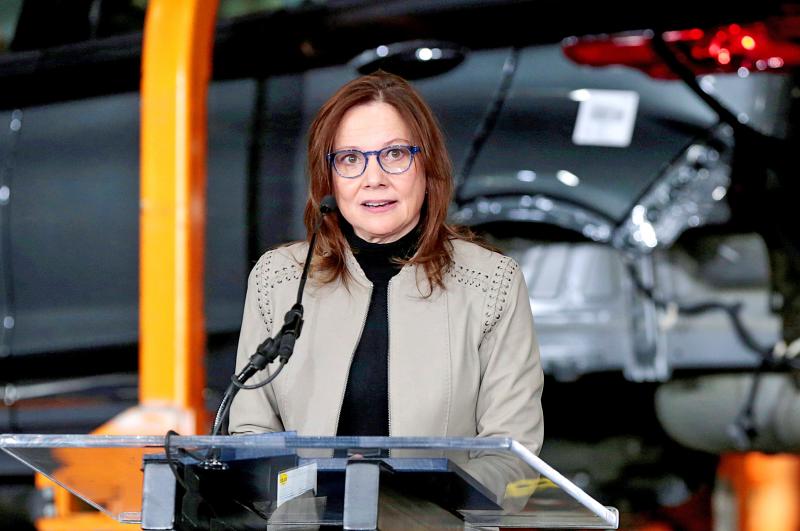General Motors Co (GM) on Tuesday announced its second major electric vehicle partnership in less than a week, this time, a US$2 billion deal with start-up Nikola Corp.
GM is to take an 11 percent ownership stake in the Phoenix, Arizona, company, and would engineer and build Nikola’s Badger hydrogen fuel cell and electric pickup truck. The Badger is expected to be in production by the end of 2022.
GM would also help with cost reductions for Nikola’s other vehicles, including heavy trucks, and the company would use GM’s battery system and hydrogen fuel technology.

Photo: Reuters
In exchange for the 10-year deal, GM is to receive US$2 billion of Nikola’s newly issued common stock that is to come in three increments through 2025.
News of the deal sent shares of both companies surging despite a broader-market downturn. Nikola’s shares jumped US$14.50, or 40.8 percent, to close on Tuesday at US$50.05. GM advanced US$2.38, or 7.9 percent, to end at US$32.38.
The move sets up GM for a new revenue stream and possibly a change in its business model, essentially becoming a parts supplier to other companies for electric vehicle frames, batteries, controls and components.
GM chief executive Mary Barra said on a conference call that GM has a “platform that others can use that’s going to give us scale and help us drive efficiency.”
She said that the electric vehicle platform and batteries are attractive to other companies, which is a huge opportunity for GM.
“We’re going to leverage that and really seize the opportunity that we have to grow,” she said.
However, she would not comment on whether GM is in talks with other companies.
Nikola would be responsible for the sales and marketing of the Badger, but it would be built on GM’s new battery electric truck underpinnings and use GM fuel cell and battery technology.
GM would also supply batteries for other Nikola vehicles, including heavy trucks.
GM has its own battery electric truck, a GMC Hummer, due to go on sale a year ahead of the Badger.
The deal is the second major partnership announced by GM this month, as it lines up companies to share in the costs of developing electric and autonomous vehicle technology.
On Thursday last week, GM said that it would join with Japanese automaker Honda Motor Co to share the costs of building vehicles powered by batteries and internal combustion engines.
Nikola founder and executive chairman Trevor Milton that the agreement relieves his firm of the expense of building another factory to make the Badger, which is a little larger than a Chevrolet Silverado.
However, the company would keep building a US factory in Coolidge, Arizona, to make heavy trucks.
Nikola, founded in 2015, has not made a profit yet and lost US$86.6 million in the second quarter.
The company expects to save more than US$4 billion in battery and powertrain costs over 10 years.

Among the rows of vibrators, rubber torsos and leather harnesses at a Chinese sex toys exhibition in Shanghai this weekend, the beginnings of an artificial intelligence (AI)-driven shift in the industry quietly pulsed. China manufactures about 70 percent of the world’s sex toys, most of it the “hardware” on display at the fair — whether that be technicolor tentacled dildos or hyper-realistic personalized silicone dolls. Yet smart toys have been rising in popularity for some time. Many major European and US brands already offer tech-enhanced products that can enable long-distance love, monitor well-being and even bring people one step closer to

Malaysia’s leader yesterday announced plans to build a massive semiconductor design park, aiming to boost the Southeast Asian nation’s role in the global chip industry. A prominent player in the semiconductor industry for decades, Malaysia accounts for an estimated 13 percent of global back-end manufacturing, according to German tech giant Bosch. Now it wants to go beyond production and emerge as a chip design powerhouse too, Malaysian Prime Minister Anwar Ibrahim said. “I am pleased to announce the largest IC (integrated circuit) Design Park in Southeast Asia, that will house world-class anchor tenants and collaborate with global companies such as Arm [Holdings PLC],”

TRANSFORMATION: Taiwan is now home to the largest Google hardware research and development center outside of the US, thanks to the nation’s economic policies President Tsai Ing-wen (蔡英文) yesterday attended an event marking the opening of Google’s second hardware research and development (R&D) office in Taiwan, which was held at New Taipei City’s Banciao District (板橋). This signals Taiwan’s transformation into the world’s largest Google hardware research and development center outside of the US, validating the nation’s economic policy in the past eight years, she said. The “five plus two” innovative industries policy, “six core strategic industries” initiative and infrastructure projects have grown the national industry and established resilient supply chains that withstood the COVID-19 pandemic, Tsai said. Taiwan has improved investment conditions of the domestic economy

Sales in the retail, and food and beverage sectors last month continued to rise, increasing 0.7 percent and 13.6 percent respectively from a year earlier, setting record highs for the month of March, the Ministry of Economic Affairs said yesterday. Sales in the wholesale sector also grew last month by 4.6 annually, mainly due to the business opportunities for emerging applications related to artificial intelligence (AI) and high-performance computing technologies, the ministry said in a report. The ministry forecast that retail, and food and beverage sales this month would retain their growth momentum as the former would benefit from Tomb Sweeping Day